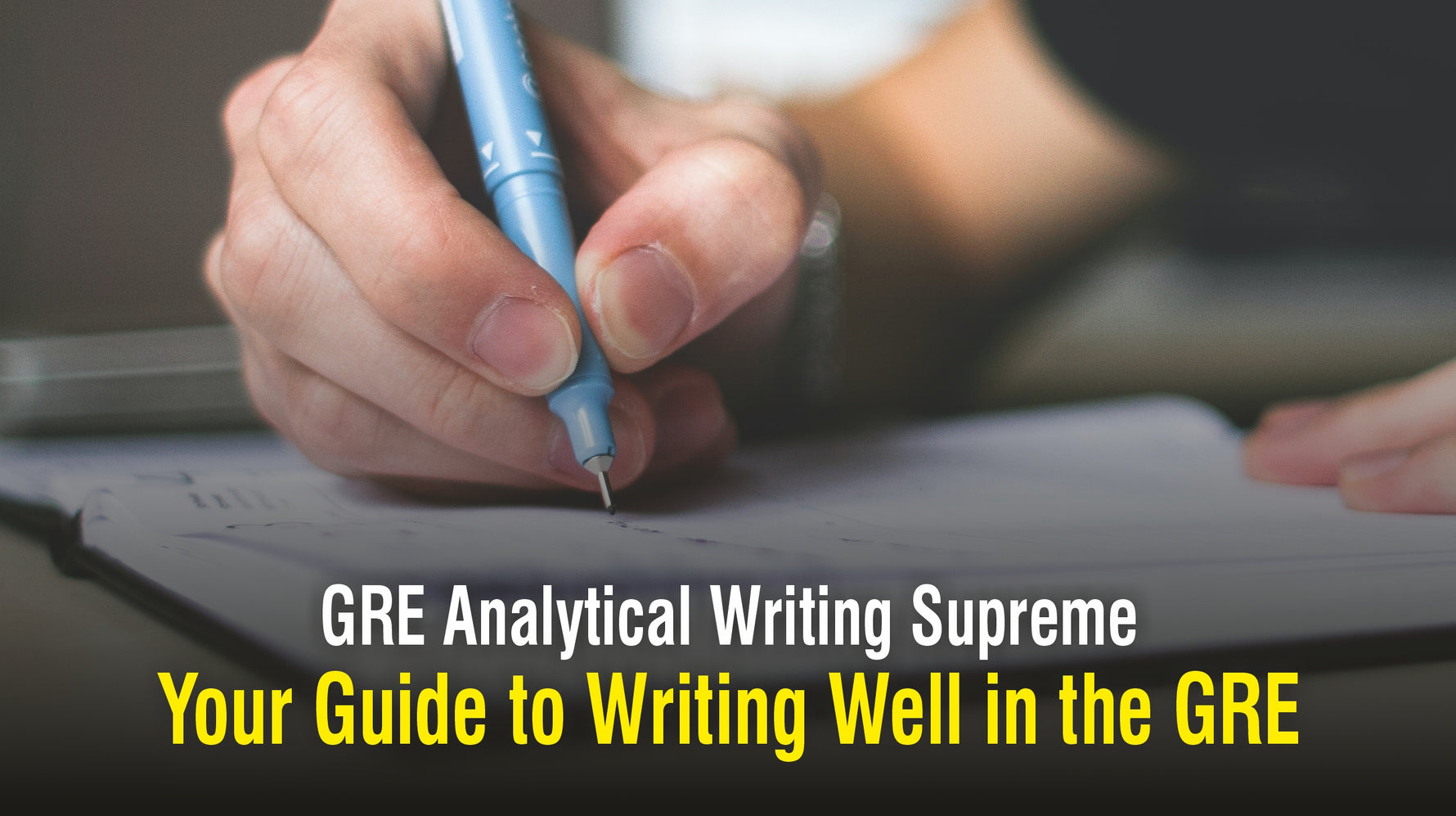Let’s face it. The GRE General Test is a tough nut to crack. You may be fluent at writing essays and answering vocabulary questions but math questions leave you bewildered or math questions look like a child’s play but vocabulary questions are not your expertise. For cracking the test, you will need to not only improve your weak areas but also practice thoroughly. For this purpose, experts recommend picking up the 3 ‘Supreme’ books that have a load of practice questions, effective tips for answering the questions, and detailed information about the GRE General Test. Read on to find out more about them!
The three sections of the GRE namely Analytical Writing, Verbal Reasoning, and Quantitative Reasoning are designed to test your vocabulary, critical thinking, organization skills, analytical abilities, and ability to form opinions on topics. Therefore, to give you a thorough, total, and focused practice of each section, the below 3 books are perfect!
#1 GRE Analytical Writing Supreme: Solutions to the Real Essay Topics
The Analytical Writing section is made up of two tasks - Analyze an Issue and Analyze an Argument task. For writing an essay on a given issue and argument in 30 minutes each, you need strong time management skills. But the key to completing the essays on time is learning to first organize your thoughts and then write them down. For doing so, there are various strategies that will help you master organization skills. In GRE Analytical Writing Supreme: Solutions to the Real Essay Topics, you will find elaborate strategies that will guide you through the process of writing essays that are logically sound. From a pool of 152 Issue topics and 176 Argument topics given by the ETS, this book contains 72 Issue and 73 Argument topics with solved essays. Before the sample essays for each topic, a detailed and strategic process to approach the topic is given.
Chinu Vasudeva, Founder at Doyen-Ed loves this book and says that, “We have been using this book for our students for the last 3 years. I would highly recommend using this book for all GRE aspirants. Example essays give you a great understanding of the pattern, writing styles, and keywords which are essential to score well in the essay section. The tasks cover important topics such as science, technology, politics, education, art, etc. The author has done full justice by explaining each topic with pointers, strategies, and a sample essay. Students can go through essays, compile all points, create their own templates, and put them into the right frame to create fantastic essays.”
#2 GRE Verbal Reasoning Supreme: Study Guide With Practice Questions
The Verbal Reasoning section is divided into two parts. This means that you will encounter two Verbal Reasoning sections of 20 questions each. These 20 questions are further divided into 3 types of questions - Reading Comprehension, Sentence Equivalence, and Text Completion.
This section tests your vocabulary and your ability to comprehend written texts and answer questions based on them. The GRE Verbal Reasoning Supreme: Study Guide With Practice Questions teaches you all about Verbal Reasoning Questions. The book has a total of 575 practice questions and separate sections dedicated to the three question types. They contain detailed information about the types of questions asked and strategies to solve them. This will help you get a focused practice of each question type. Additionally, the book contains 3 practice tests of the Verbal Reasoning section to test your learning.
Reader’s Favorite calls this book “ a comprehensive textbook to help students undertaking the GRE prepare for the Verbal Reasoning section of the exam.” In a detailed review, it said, “With practice questions and complete verbal tests that effectively simulate the real exam by covering a multitude of potential subjects, the answers provided include explanations to help you understand why the possible responses are correct and what you need to take away from them. It’s safe to say that this guide fills in all the essential gaps one might require when practicing Verbal Reasoning, but it elevates this advice with additional features such as logical and easy-to-refer-to organization, as well as a perky and inspirational narrative tone to keep students motivated through tough times.”
The purpose of this book is to give you as much practice as possible so that you get well versed in the format of the questions and easily answer them on the actual day of the test!
#3 GRE Quantitative Reasoning Supreme: Study Guide With Practice Questions
The Quantitative Reasoning section also appears as two sections in the test. The two sections contain 20 questions to be solved in 35 minutes each. The questions in this section are based on Arithmetic, Algebra, Geometry, and Data Analysis. GRE Quantitative Reasoning Supreme: Study Guide With Practice Questions is a comprehensive and detailed guidebook for preparing for this section. This book has a collection of a whopping 520 practice questions that cover the different types of questions like Numeric Entry, Multiple Choice Single Answer, Multiple Choice Multiple Answers, Data Analysis & Quantitative Comparison. The questions in the book are also segregated according to their difficulty levels so that you can analyze the areas that you are good at and the areas you are weak in.
Unlike other books in the market where the answers are just stated for you to interpret, this book entails solutions explained in detail. This will be immensely helpful for you to know why an option is correct or incorrect, interpret the logic behind complex problems, and boost your confidence to appear for the Quant section in the real test.
“GRE Quantitative Reasoning Supreme is thoughtfully organized and easy to use. I enjoyed going through it and was very impressed,” comments Laura Mischke, Head of Adult Services, Bellevue Public Library. “The format of the GRE along with the testing and scoring procedures are explained so that there will be no surprises for the student on the day of the test. If a student determines that there is an area of weakness, he/she can easily find that section and focus attention on problems of that specific type. All problems have step-by-step explanations and are very easy to follow,” she adds.
Studying for the GRE can be daunting and challenging. With a variety of topics to prepare for, one may experience stress. Keeping this in mind, the books also come with a Stress Management ebook. This ebook contains a 6-month and an 8-week study plan to organize your prep and make sure that you don’t miss anything. Tips and advice for managing your stress before the test and on the actual test day are also given.
Here are some tips to follow on the test day:
Pay attention to the questions and don’t misread them. Try to stick to the instructions given in the questions so that you don’t deviate from their intent.
Answer questions that are easier first and keep the difficult ones for later.
You will have to answer different types of questions in a limited amount of time so make sure that you budget your time properly at the start of the test itself.
Use the elimination process for answering multiple choice questions. Eliminate the options that you think are not correct.
For the Quant section, use the reverse equation method to check if your answers are correct.
Read the passages thoroughly in the Verbal Reasoning section and rely only on the information given in it to answer questions.
You may have heard this a lot of times but practice is the key to cracking the test. The amount of effort you put into practice will not be in vain as that will help you master the questions and overcome the fear of the test. Apart from these books, you can also check out 6 Practice Tests for the GRE that will give you a simulated practice environment for the test.
Good Luck!

















